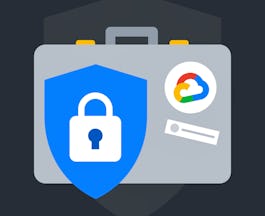Filter by
The language used throughout the course, in both instruction and assessments.
Explore the Budget Course Catalog


Google Cloud
Skills you'll gain: Cloud Management, Expense Management, Google Cloud Platform, Cloud Computing, Cloud Infrastructure, Site Reliability Engineering, Corporate Sustainability, Budget Management, Scalability, Identity and Access Management, Infrastructure Architecture, Customer Support, Disaster Recovery


Coursera Project Network
Skills you'll gain: Financial Forecasting, Revenue Forecasting, Capital Budgeting, Cash Flow Forecasting, Profit and Loss (P&L) Management, Business Valuation, Financial Analysis, Financial Modeling, Equities, Cash Flows


Coursera Project Network
Skills you'll gain: Capital Budgeting, Business Valuation, Financial Analysis, Financial Modeling, Return On Investment, Financial Market, Finance, Investment Banking, Corporate Finance, Risk Management

Skills you'll gain: Back-End Web Development, Front-End Web Development, HTML and CSS, User Interface (UI), Generative AI, Web Applications, Application Programming Interface (API), Figma (Design Software), OpenAI, Real Time Data, Artificial Intelligence


L&T EduTech
Skills you'll gain: Project Schedules, Earned Value Management, Risk Analysis, Cost Estimation, Scheduling, Cost Management, Project Management, Project Planning, Resource Allocation, Risk Mitigation, Resource Management, Timelines, Risk Management, Budgeting, Project Performance, Performance Measurement, Estimation, Dependency Analysis, Network Model


Coursera Project Network
Skills you'll gain: Facebook, Social Media Marketing, Social Media, Social Media Strategy, Advertising, Budget Management, Marketing, Campaign Management, Target Audience, Customer Insights, Customer Engagement


Coursera Project Network
Skills you'll gain: Canva (Software), Instagram, Social Media, Content Creation, Social Media Marketing, Graphic and Visual Design, User Accounts, Dashboard


University of Colorado System
Skills you'll gain: Sample Size Determination, Biostatistics, Statistical Analysis, Data Analysis, Clinical Research, Statistical Methods, Science and Research, Statistical Hypothesis Testing


Yonsei University
Skills you'll gain: Capital Budgeting, Financial Statement Analysis, Business Valuation, Strategic Decision-Making, Financial Analysis, Entrepreneurial Finance, Financial Management, Financial Modeling, Market Analysis, Competitive Analysis, Cash Flow Forecasting, Business Research, Business Analysis


Coursera Project Network
Skills you'll gain: Presentations, Graphic and Visual Design Software, Marketing Materials, Content Creation, Graphic and Visual Design, Data Sharing, Creative Design

Skills you'll gain: Professional Networking, Budget Management, Digital Marketing, Promotional Strategies, Marketing Strategies, Resilience, Strategic Partnership, Growth Strategies, Relationship Building, Brand Awareness, Social Media Marketing, Cost Management, Brand Strategy, Business Relationship Management, Business Development, Brand Management, Communication Strategies


University of Virginia
Skills you'll gain: Project Management Life Cycle, Project Risk Management, Earned Value Management, Project Planning, Project Management, Goal Setting, Risk Analysis, Project Performance, Stakeholder Management, Sprint Planning, Scheduling, Agile Methodology, Stakeholder Communications, Work Breakdown Structure, Dependency Analysis, Kanban Principles
In summary, here are 10 of our most popular budget courses
- Scaling with Google Cloud Operations - 日本語版: Google Cloud
- Оценка компании по модели DCF: Coursera Project Network
- Введение в оценку компаний с WACC: Coursera Project Network
- Build an AI Travel Agent App with OpenAI: Scrimba
- Project Planning and Execution Management: L&T EduTech
- Erste Schritte in Facebook Ads Manager: Coursera Project Network
- How to edit photos for Social media with Canva: Coursera Project Network
- Biostatistics Study Design and Analysis for Grant Writing: University of Colorado System
- Valuation and Financial Analysis For Startups Capstone: Yonsei University
- الخطوات الأولى في فيسمي: Coursera Project Network












